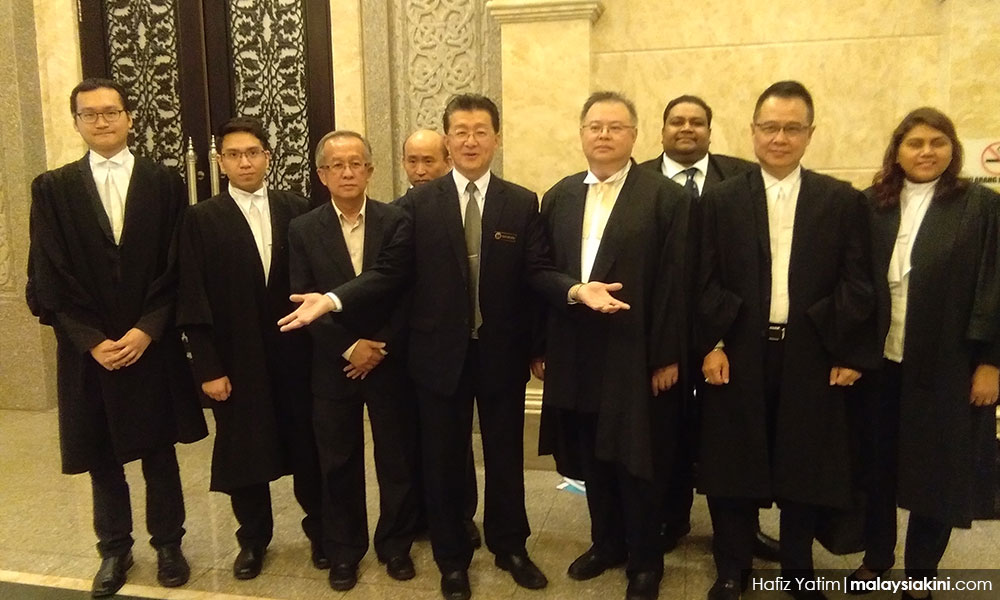
In a landmark decision, the Court of Appeal today ruled that the Urban Wellbeing, Housing and Local Government Ministry must give housebuyers the right to be heard before they give developers Extension of Time (EOT) to complete a project.
The decision today would affect thousands of housebuyers. It was reported last year that the ministry had issued 304 EOTsas of April 2017, to developers.
The case by 104 housebuyers against the ministry and developer BHL Construction Sdn Bhd, is a test case, said National House Buyers Association honorary secretary-general Chang Kim Loong.
This particular case captured a lot of attention following reports that a relative of attorney-general Mohamed Apandi Ali sought the help of minister of housing in 2015, Abdul Rahman Dahlan, to secure an EOT.
A police report was also lodged against Rahman and Faridah Begum KA Abdul Kader, who is Apandi's wife, in Penang.
A three-member panel led by Justice Wong Dak Wah, today unanimously ruled that house buyers must have been consulted before the developer applied for EOT.
In the broad grounds read by Justice Harminder Singh Dhaliwal, the bench also ruled that the EOT granted to the company for 12 months is null and void as it was not signed by the controller of housing, but one by the name of N Jayaseelan.
"Since the minister did not file any affidavit to provide some clarity, the contention that the minister was not the one who made the decision has merit and cannot be dismissed lightly.
"We are, therefore, of the view that the order as contained in the Nov 17, 2015, letter, was made without jurisdiction and ultra vires to the Act. Accordingly, we hold that the order in the said letter is a nullity and of no effect," said Justice Harminder.
The bench, which also consisted Justice Hasnah Mohamed Hashim, however, ruled and disagreed with the Kuala Lumpur High Court that Regulation 11 (3) of the Housing Development Regulation 1989 was not ultra vires or against the Housing Development Act (Control and Licensing) Act.
The said regulation allows the minister to issue EOT to developers via the controller, but Section 24 (2) (e) of the Act allows the minister to regulate the contract between the developer and the house buyer.
"We agree that the judge had erred in declaring the regulations is ultra vires," he said.
On the issue of rights to be heard, Justice Harminder said as purchasers comprise a group which can easily be ascertained, they should at least be notified of the developer's application for EOT to complete the project, and given a reasonable period of time to state their views before any decision is made.
"We agree that the purchasers must be given an opportunity to be heard prior to any decision made.
"As no such right to be heard was afforded to the purchasers, it is our judgment that the decision made in this case, whether by the controller or minister, was null and void and of no effect and should accordingly be set aside," he said.
The bench did not make any order as to costs.
The housebuyers were represented by a team of lawyers led by Andy Wong, who did the case pro bono.
The house buyers filed the judicial review application on July 2016, where 104 of them challenged the regulation 11 (3) and also the EOT issued on Nov 17, 2015.
The lawyer said that despite the bench allowing the ministry's appeal, what is important is that the court today pronounced the developer's need to consult with the house buyers when they want to apply for EOT.
Previously, a developer can go to the ministry to seek EOT without informing the house buyers, he said.
"Now with this judgment the developer must go to the house buyers. That was not provided for under the regulation.
"Hence, now the ministry must amend the existing law to give house buyers the right to be heard before the EOT," he said.
The lawyer explained that sometimes in the construction of a condominium or apartment, a period of 60 months is given to complete the project, and generally, about 36 months, for the sales and purchase agreement.
But when a project faces a problem with completion, the lawyer said the developer could run to the ministry to seek the EOT.
He added that now it is up to the house buyers whether they want to pursue the case further.
According to Chang, the extension of EOT without housebuyers' knowledge works to the detriment of house buyers as they service the loan, but when the house is not complete, they face more costs of possibly starting a family, and not being able to move into the house.
He said that a developer could do this (apply for EOT) to possibly avoid paying liquidated damages for late delivery, which house buyers are entitled to when a project is delayed.
This, Chang said, comes to 10 percent of the purchasing price per year, as long as the project is delayed as stipulated in the sales and purchase agreement. -Mkini



No comments:
Post a Comment
Note: Only a member of this blog may post a comment.